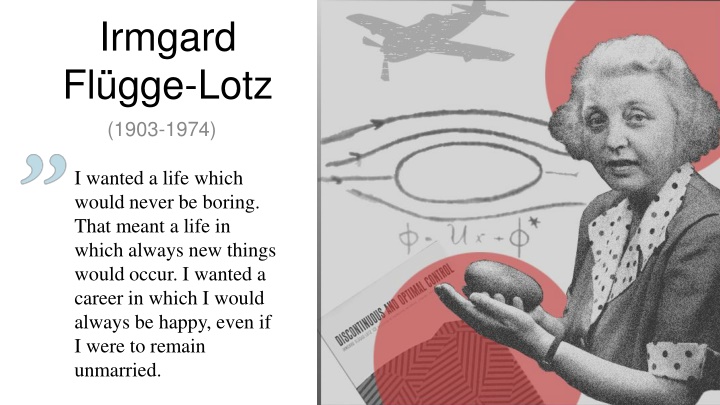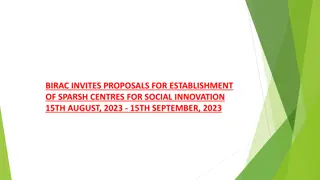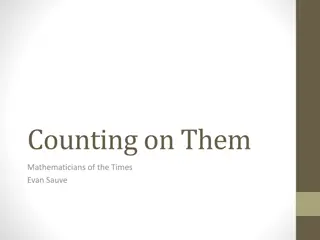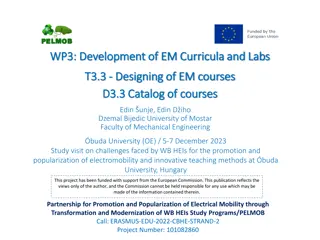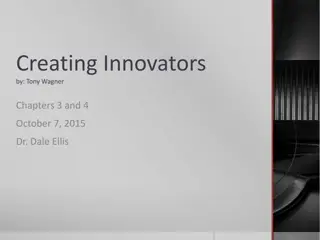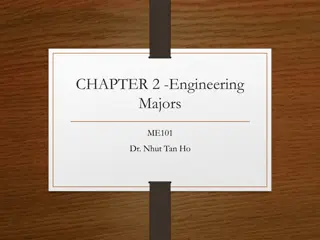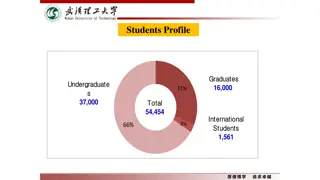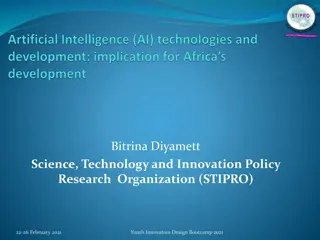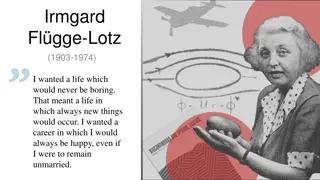Trailblazing Mathematicians and Innovators in Engineering
Irmgard Flügge-Lotz, a German mathematician, made significant contributions to aviation theory and engineering, paving the way for future female engineers. Nina F. Thornhill, a British innovator, focuses on sustainable operation of industrial systems. Both women have received prestigious awards and have left a mark on their respective fields.
Download Presentation

Please find below an Image/Link to download the presentation.
The content on the website is provided AS IS for your information and personal use only. It may not be sold, licensed, or shared on other websites without obtaining consent from the author.If you encounter any issues during the download, it is possible that the publisher has removed the file from their server.
You are allowed to download the files provided on this website for personal or commercial use, subject to the condition that they are used lawfully. All files are the property of their respective owners.
The content on the website is provided AS IS for your information and personal use only. It may not be sold, licensed, or shared on other websites without obtaining consent from the author.
E N D
Presentation Transcript
Irmgard Fl gge-Lotz (1903-1974) I wanted a life which would never be boring. That meant a life in which always new things would occur. I wanted a career in which I would always be happy, even if I were to remain unmarried.
German mathematician and pioneer in aviation theory Best known for: The theory of discontinuous, or on-off, control systems and the Lotz method, a method for calculating the spanwise lift distribution of a three-dimensional wing. Appointments: In 1960, she became the first female professor of engineering at Stanford University after more than a decade of performing the duties of one. Honors and awards: The Achievement Award by the Society of Women Engineers (1970) and an honorary doctorate of science by the University of Maryland (1973). She was also chosen by the American Institute of Aeronautics and Astronautics to give the prestigious annual Karman lecture in 1971.
Education: Mathematics and engineering at Leibniz University, Hannover. Influences: Irmgard Fl gge-Lotz was encouraged by her mother to pursue technical subjects. For many generations, her mother s family had been involved in construction, and Irmgard Fl gge- Lotz often visited construction sites with her uncle and attended matinee shows for technical films.
Nina F. Thornhill (b.1953) You can find anything you want in data, but whether it is meaningful requires one to understand the processes behind the analysed systems.
British innovator of tools and approaches for a more sustainable operation of large-scale production plants Best known for: Her innovative approaches and tools for process monitoring, and for the detection and diagnosis of persistent faults in the operation of large-scale industrial systems, such as chemical plants. Appointments: Professor at the Department of Electronic and Electrical Engineering at the University College of London and ABB/Royal Academy of Engineering Chair of Process Automation at the Department of Chemical Engineering, Imperial College London.
Honors and awards: The Nordic Process Control Award for her research contributions and significant contributions as a coordinator of several European Marie Sklodowska-Curie projects, bringing together industrial and academic partners to train early-stage researchers in the field of process automation and control. Education: Bachelor s degree in physics from Oxford University and master s degree in control systems at Imperial College London. Influences: Her father, who was a physicist.
Sirkka-Liisa J ms -Jounela (b.1952) If you are interested in and love your work, you will be successful.
Finnish engineer and specialist in advanced control strategies and fault monitoring Best known for: Her comprehensive work in developing new and efficient process control and management theories, increasing the sustainability of production processes in the process industry. Appointments: Professor at Aalto University, vice chair and chair of IFAC s Technical Board, and vice president of IFAC*. *International Federation of Automatic Control
Honors and awards: The IFAC Distinguished Service Award for IFAC officials who have served and contributed substantially to IFAC and the Order of the White Rose of Finland, conferred upon citizens who have distinguished themselves in the service of Finland. Education: Mathematics, technical physics, process engineering, and control at Oulu University. Influences: Her colleagues in IFAC. As a prominent figure in IFAC, Sirkka-Liisa J ms -Jounela herself has positively encouraged many young women engineers to proceed within the field of engineering.
Eveline Gottzein (b.1931) I was fascinated by the opportunities and determined to use them to the greatest possible extent.
German engineer and expert in control systems for satellites and high-speed trains Best known for: The development of control systems for the guidance of high-speed magnetic levitation trains and for developing the Attitude and Orbit Control System (AOCS) of satellites. Appointments: Eveline Gottzein was with B lkow Entwicklungen KG (later MBB) for almost 50 years. She was also an honorary professor of aerospace engineering at the University of Stuttgart, where she taught a course on control problems in space travel. In addition, she has acted as an advisor for the Airbus group.
Honors and awards: Eveline Gottzein is the first, and so far only, woman to have received the Werner von Siemens ring - one of the highest awards for technical sciences in Germany. Education: Electrical engineering, mathematics, and physics at the Technical University of Dresden and the Technical University of Darmstadt. Influences: Ludwig B lkow, the director of B lkow Entwicklungen KG, and the way he allowed his employees free reign, releasing their creative forces.
Bozenna Pasic-Duncan (b.1947) If you choose only one course at the university, choose mathematical statistics because we deal now with data, randomness, and uncertainty.
Polish mathematician, expert in stochastic control and a champion for women in engineering Best known for: Her passionate approach to mathematical education and promoting women in STEM (i.e. Science, Technology, Engineering, and Maths). She co-founded the Women in Control group within the Institute of Electrical and Electronics Engineers (IEEE) Control Systems Society and has chaired the Women in Engineering group of 20 000 global members. Bozenna Pasik-Duncan has also been chair of the International Federation of Automatic Control (IFAC) task force on diversity and inclusion. Education: Mathematics at the university of Warsaw.
Research advances Applying the theory of stochastic adaptive control in various fields such as aerospace guidance and control, signal processing and communications, manufacturing processes, financial economics, and health science. Honors and awards: Bozenna Pasik-Duncan has received numerous awards for her efforts as a teacher and for supporting and promoting women in STEM fields. She has also received the IEEE Control Systems Society Distinguished Member Award and the IFAC Outstanding Service Award for her many years of service to IEEE and IFAC in senior positions.
